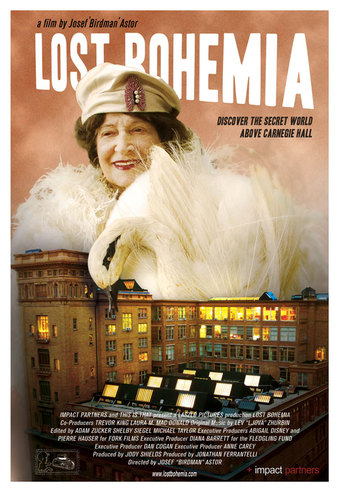The march of progress, even in the cultural world, is never without costs, as a new documentary called Lost Bohemia demonstrates. Made by Josef “Birdman” Astor, it tells the story of the legendary studios above Carnegie Hall, which have been occupied over the years by the likes of George Ballanchine, Mark Twain, Norman Mailer, Isadora Duncan, Barnett Newman, Elizabeth Sargent and many more.
 In 2001, the Carnegie Hall Corp. began to evict these artists so that it could expand into the space. For more on that, here’s Nick Paumgarten’s New Yorker TOTT from 2007 and one of many articles in The New York Times, this one written in 2010 by Liz Robbins.
In 2001, the Carnegie Hall Corp. began to evict these artists so that it could expand into the space. For more on that, here’s Nick Paumgarten’s New Yorker TOTT from 2007 and one of many articles in The New York Times, this one written in 2010 by Liz Robbins.
I’m writing about it now, without having seen the film, because it will be shown for a week beginning Friday at the IFC Center in New York. (It premiered last fall at the DOC NYC Festival, and so far, according to its website, the documentary has also been screened at the Sarasota Film Festival and the National Gallery of Art in Washington.) You may not want to miss it.
Astor, who lived in the studios (which at one time numbered 160), tells the darker side of the story hinted at in Bill Cunningham, the hit documentary about the NYT photographer who also lived there.
As Astor, who used a hand-held camera to chronicle the remaining residents, writes on the Lost Bohemia website:
Tragically, this documentary is the only film record of the extraordinary studios, and the last denizens of a community that has inhabited them for over a century. Conceived by philanthropist Andrew Carnegie, the studios offered affordable spaces for artists to work and live, and were specifically designed for actors, painters, singers, and musicians with north-facing skylights, sprung wood floors, and soundproof walls.
The studios’ significance to 20th Century culture cannot be overstated…
I couldn’t find any reviews (yet), but artist Pamela Talese, who has seen the film, feels strongly about it and the story it tells: “Through interviews with the last marvelous and eccentric artists-in-residence at home in these secret spaces where artists and performers have lived and worked for over 100 years, Lost Bohemia is at once humorous and heartbreaking,” she says.
“It begs the question of what kind of cultural center New York will become if it continues to cater only to those of high privilege and low imagination,” Talese adds.
I’m guessing you’ll want to see it and decide the case for yourself. As a teaser, there’s a trailer on that website, and here on YouTube Astor talks about the film.
Unlike The Art of the Steal, about the Barnes Foundation, I don’t think Astor is trying to reverse the course of history here — it’s too late for that.
Photo Credit: Courtesy of Lost Bohemia
